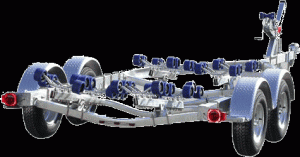
1. Consider warranties. Investigate the warranties for every boat you are considering. Warranties are valuable, and should be an influencer in your decision. Some warranties are transferable, which may become a selling point if you decide to sell your boat. Find out what the warranty includes (engine, hull, components, accessories, service, etc.) and find out about the service that you will receive if something fails. A good way to do this is to ask for references. If you are considering buying a pre-owned boat, be sure to get a marine survey – hire this person yourself to ensure that the survey is done with your interests in mind.
2. Keep a log. At the boat show and as you visit local dealerships, document everything: Take pictures of the dashboard, the galley, the head. Take notes, or record your reactions on a recording device. Involve your family with the decision and listen to their likes and dislikes about each boat. No two boats are exactly the same – but there exists a perfect boat for you and yours. Use your short list of features and brands to quantify your observations… Make a chart, and use it to rank your top choices.
3. When are you ready? Reminder: There is no correct amount of time that it should take to shop for a boat. For some, one afternoon is all that they need. It takes others several years. The right time for you to buy a boat is when you are ready. Boat shows often offer “show specials” to entice you to purchase at the show. Ask the dealer if he/she would honor that price in a few weeks after doing some more shopping… Chances are the answer will be yes.
4. The Test Drive. Did you realize that you can test drive a boat? The way a boat handles, and the way it feels on the water is a very important consideration. Bring the family along for your test drives, and try to test the boat in the types of conditions where you will be using it.
5. The cost of ownership. For most, the cost of owning a boat is nothing compared to the benefits derived from owning and using your own boat. Nonetheless, be sure you understand that the cost of owning a boat includes more than just the fiberglass. You’ll have to spend money on maintenance essentials like outboard motor oil as well.
6. Learning to use your new boat. Boating is not difficult, but driving a boat, like anything else, is a skill. If you have not already, sign up for boaters education courses where you can learn the rules of the road. For on-the-water training, some dealers provide captains to train you on how to use your boats. Others leave it up to you to learn. Most marinas and dealerships have a network of captains or experienced boaters that you can hire to show you the ropes on your own boat. Most likely the only parts that will require practice will be docking, launching and retrieving your boat. The best tip here is just to take it slow and practice.
Did you like this? Share it:
 Even the if you think that your baby is indestructible, all boats need primo care. With winter upon us, it is time to start winterizing your boat and reading up on the precautions you need to take to ensure a long life for your craft. Below is a step-by-step guide to winterizing your boat, but before you begin, drain the gear case and check for excessive moisture in the motor.
Even the if you think that your baby is indestructible, all boats need primo care. With winter upon us, it is time to start winterizing your boat and reading up on the precautions you need to take to ensure a long life for your craft. Below is a step-by-step guide to winterizing your boat, but before you begin, drain the gear case and check for excessive moisture in the motor.


 It has been about 30 years since the first ATV was introduced to the market, and since then they have become more and more popular every year. Just what is the appeal of these three and four wheel machines, could it be just the excitement that riding them creates? Nowadays you will find entire families enjoying the excitement and riding as a family activity. But there is always down sides to things, and riding ATVs is no different. Many accidents happen each year to people riding ATVs, keeping a few things in mind and following some simple safety procedures could keep you in the safe zone at all times.
It has been about 30 years since the first ATV was introduced to the market, and since then they have become more and more popular every year. Just what is the appeal of these three and four wheel machines, could it be just the excitement that riding them creates? Nowadays you will find entire families enjoying the excitement and riding as a family activity. But there is always down sides to things, and riding ATVs is no different. Many accidents happen each year to people riding ATVs, keeping a few things in mind and following some simple safety procedures could keep you in the safe zone at all times.
 While ATVs have become commonplace now, they have only been in the market for a relatively short amount of time. Introduced in the 1970s, all terrain vehicles (better known as ATVs) were at first met with a high incidence of injury. But this was largely attributed to improper use by the riders. To increase the level of safety, the norm was changed from three wheels to four wheels. Regardless of the number of wheels, an ATV can be described as any vehicle with low pressure tires, handlebars for steering, and a seat that must be straddled by the rider.
While ATVs have become commonplace now, they have only been in the market for a relatively short amount of time. Introduced in the 1970s, all terrain vehicles (better known as ATVs) were at first met with a high incidence of injury. But this was largely attributed to improper use by the riders. To increase the level of safety, the norm was changed from three wheels to four wheels. Regardless of the number of wheels, an ATV can be described as any vehicle with low pressure tires, handlebars for steering, and a seat that must be straddled by the rider. I can’t think of anything that reminds me more of summer than cruising around the lake on a fishing boat with my dad. He owned a beautiful Eagle 190, one of many G-3 boats in the Yamaha line. Before hitting the lake every year, we would set aside a day to do some basic tune-ups and maintenance, like flushing the engine and replacing the
I can’t think of anything that reminds me more of summer than cruising around the lake on a fishing boat with my dad. He owned a beautiful Eagle 190, one of many G-3 boats in the Yamaha line. Before hitting the lake every year, we would set aside a day to do some basic tune-ups and maintenance, like flushing the engine and replacing the 
